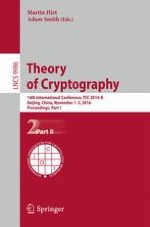2016 | OriginalPaper | Buchkapitel
Adaptive Succinct Garbled RAM or: How to Delegate Your Database
verfasst von : Ran Canetti, Yilei Chen, Justin Holmgren, Mariana Raykova
Erschienen in: Theory of Cryptography
Verlag: Springer Berlin Heidelberg
Aktivieren Sie unsere intelligente Suche, um passende Fachinhalte oder Patente zu finden.
Wählen Sie Textabschnitte aus um mit Künstlicher Intelligenz passenden Patente zu finden. powered by
Markieren Sie Textabschnitte, um KI-gestützt weitere passende Inhalte zu finden. powered by
